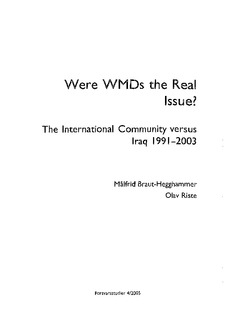| dc.contributor.author | Braut-Hegghammer, Målfrid | |
| dc.contributor.author | Riste, Olav | |
| dc.date.accessioned | 2011-10-05T12:03:49Z | |
| dc.date.available | 2011-10-05T12:03:49Z | |
| dc.date.issued | 2005 | |
| dc.identifier.issn | 0333-3981 | |
| dc.identifier.uri | http://hdl.handle.net/11250/99529 | |
| dc.description | In Resolution 687, after the Gulf War of 1991, the United Nations Security Council unanimously demanded that Iraq get rid of all weapons of mass destruction, and imposed economic sanctions as well as an intrusive inspection regime. The present study describes and analyses the developments that followed in Iraq, the evolving policy of the United States, the divisions that gradually emerged in the Security Council as to how to deal with Saddam Hussein’s regime, and the role of the western intelligence agencies. | en_US |
| dc.language.iso | eng | en_US |
| dc.publisher | Institutt for Forsvarsstudier | en_US |
| dc.relation.ispartofseries | Forsvarsstudier;4 | |
| dc.subject | Irak | en_US |
| dc.subject | masseødeleggelsesvåpen | en_US |
| dc.subject | USA | en_US |
| dc.subject | utenrikspolitikk | en_US |
| dc.subject | nedrustning | en_US |
| dc.title | Were WMDs the Real Issue?: The International Community versus Iraq 1991-2003 | en_US |
| dc.type | Others | en_US |
| dc.source.pagenumber | 132 s. | en_US |
